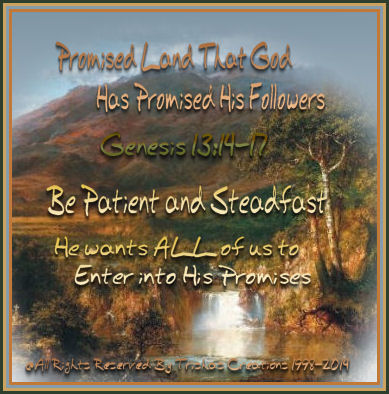The Promised Land That God Has Promised His Followers
 The “Promised Land”
The “Promised Land”
The “Promised Land” is the name given to the area promised by God to Abraham and his descendants. Thus it more or less refers to the same territory described by such terms as “Canaan,” “Palestine,” “Israel,” and “the Holy Land.”
But “Promised Land” emphasizes the fact that this territory was a gift from God to the Israelite’s.
The HISTORY
The importance of this land area is first seen in the Bible when God called Abraham out of Ur and into Canaan. This was a turning point in God’s relations with humankind.
Beginning at this point, he would focus on one people group, living in one area, in his program of salvation. The Lord made two promises to Abraham.
The promises of land and descendants are tied up together. The first time God made the promise of land to Abraham was when Abraham was new in Canaan (Genesis 12:7). But he repeated the promise at least four additional times throughout the remaining years of Abraham’s life (Genesis 13:14-17; 15:7, 18-21; 17:8; 22:17).
- the patriarch would have many descendants.
- those descendants would occupy the land of Canaan.
God made the same promise to Abraham’s son Isaac (Genesis 26:3-4) and grandson Jacob (Genesis 28:13-15; 35:12). But none of the three patriarchs ever possessed the land themselves. They were nomads, moving from place to place with their herds. All they ever possessed was the burial cave of Machpelah, near Hebron, where they were all laid to rest (Genesis 23; 49:29-32).
It was left for another generation of Hebrews to possess the land. After the period of the patriarchs, the Hebrew people lived in Egypt as slaves for many years. Then Moses led them out of Egypt and they lived in the wilderness of Sinai for forty years. Only after that, under the leadership of Joshua, did the people begin their conquest of Canaan, the Promised Land.
All this had been foretold centuries before to the original recipient of the promise:
Abraham (Genesis 15:13-16)
Even after possessing the land, the people needed to realize that it was a gift to them from God. And in fact, it was God, not they, who owned the land. The Lord said to them, “The land … really belongs to me. You are only foreigners and tenants living with me” (Leviticus 25:23). The Hebrew people could continue to live in the Promised Land only as long as they were faithful to God.
If they were disobedient, God warned them before they conquered Canaan, “You [will] disappear from the land you are about to enter and occupy. For the Lord will scatter you among all the nations from one end of the earth to the other” (Deuteronomy 28:63-64).
The eventual Diaspora of the Jews shows that the promise of their own special land was a promise that the Jews should not have taken for granted.
GEOGRAPHY
The Bible gives a couple of descriptions of the Promised Land’s extent. God told Abraham, “I have given this land to your descendants, all the way from the border of Egypt to the great Euphrates River” (Genesis 15:18). At another point the Lord said, “I will fix your boundaries from the Red Sea to the Mediterranean Sea, and from the southern deserts to the Euphrates River” (Exodus 23:31).
With these descriptions, we can define the borders of the Promised Land pretty exactly.
On the west, the Mediterranean Sea provided the border.
On the east, the margin of the desert lands served as a border. The eastern side of the Promised Land presumably included Edom, Moab, Ammon, and Gilead, all lying between the Jordan River valley and the Arabian desert.
On the south, the border was marked by two natural features. One was the “Brook of Egypt.” Today called Wadi el-Arish, this seasonal river forms a natural boundary between Israel’s southern Negev Desert and Egypt’s Sinai Peninsula.
The second natural boundary point was the northern tip of the Gulf of Aqaba, an extension of the Red Sea. The Israelite port city of Ezion-Geber was established there.
On the north, the nearest loop of the Euphrates River, in the area of the city of Tiphsah, supplied a boundary. Did the Israelites ever control the whole Promised Land?
Apparently they did, for a brief while, during the nation’s greatest extent under King Solomon (1 Kings 4:24). But the constant change in the borders of the nation throughout its history tells a story of the people’s difficulty in fully occupying the Promised Land.
Some theologians think the promise of land to the Jewish people is yet to be fulfilled in a literal way. They see the modern state of Israel as a foothold from which the Jewish people will eventually reach out and possess the entire land area promised to Abraham.
Other theologians are not so sure. They point out that God’s promise of land was fulfilled literally in biblical times. They also argue that, if the promise is yet to be fulfilled in some sense, its fulfillment is of a spiritual sort as Christ’s followers dwell in the “promised land” of heaven.
![]()